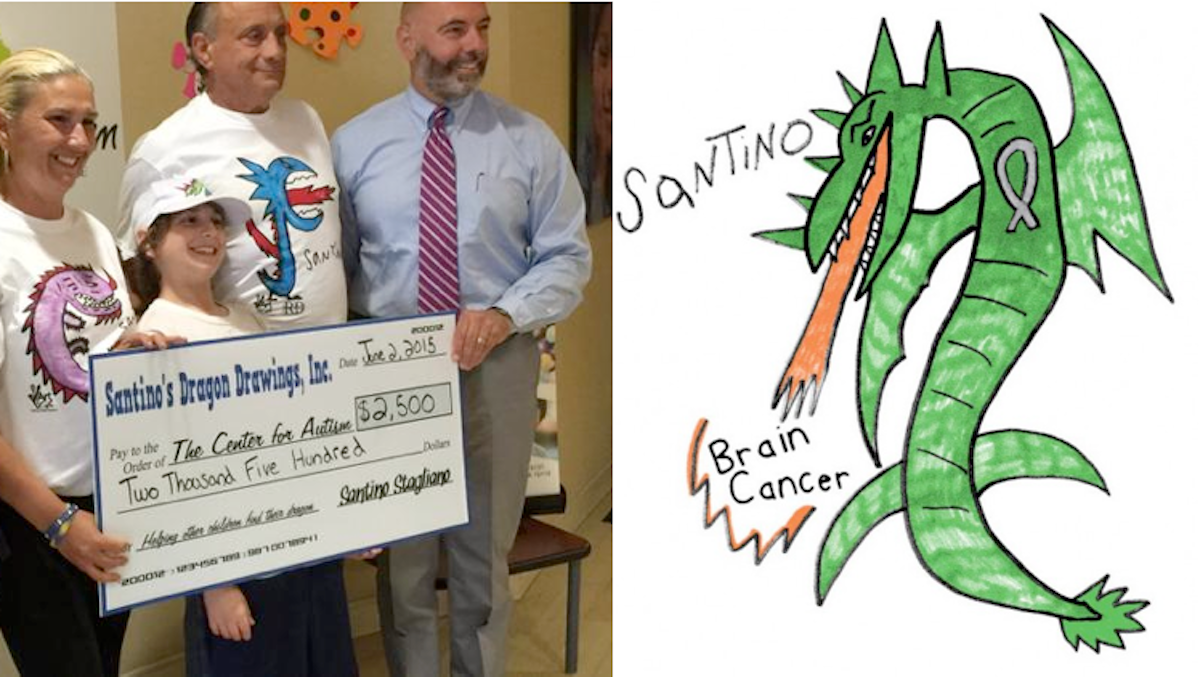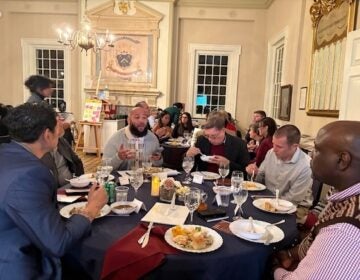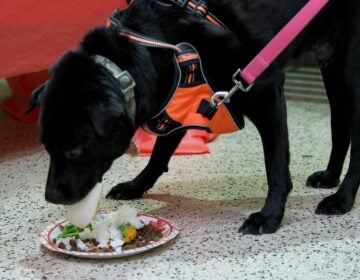Young autistic artist creates T-shirt to boost pediatric brain-cancer awareness

Santino Stagliano, shown donating $2,500 to The Center for Autism, created a T-shirt design to help a pediatric brain-cancer initiative at CHOP. (NewsWorks/file art; Facebook)
The Dragon Master continues to give back.
Ten-year-old Santino Stagliano, an autistic youth who found his voice by drawing pictures of dragons, is using his artistic gift to help raise awareness for a pediatric brain-cancer initiative at the Children’s Hospital of Philadelphia and beyond.
Amanda Haddock is president and co-founder of Dragon Master Foundation, a Kansas-based organization that was born of personal tragedy.
After her son David died of brain cancer in 2012, the foundation “that strives to speed biomedical discovery by developing and implementing tools and technology to empower cancer researchers” came to be.
Having read about Santino from afar, she said she recognized “the dragon connection.” She also knew that her group’s connection with an effort at CHOP could benefit from that link.
“I reached out to Santino to see if he would be interested in helping us raise awareness for kids with cancer,” said Haddock, who was honored as one of the White House’s Champions of Change. “He has such a big heart, and he immediately agreed to help.”
To that end, the foundation has ordered 50 shirts in hopes of having them shipped out in time for Childhood Cancer Awareness month in September. The aim, said Haddock, is to “start a conversation and bring about awareness.”
Santino “designed a shirt that we are printing to raise money for a very special research program that is currently centered at CHOP,” said Haddock.
That program will “build a [cloud-based] database with open access, meaning researchers all over the U.S. can use it. It is an amazing resource that is really unprecedented in the world of pediatric cancer research.”
She also offered an explanation of the program heavier in scientific aspects:
Since only about 4 percent of National Institutes of Health funding goes to pediatric cancer programs, the initiative is critical to pediatric research efforts.
Basically, they are building an online platform where researchers can share raw data of all types. They will collect whole genome sequencing, tissue and blood samples, and clinical records all in one cohesive platform.
Because of a unique programming “key” called the “honest broker” system, data can be updated from the clinical side and researchers can get that new information, but they still only see a record without an identity.
So, instead of seeing only a snapshot of a patient at one moment in time, they can track a patient and see if treatments are successful and begin to understand why some patients do well on a clinical trial while others do not.
Once the database is fully functional, patients whose records are entered into this system will have the benefit of being part of larger research efforts.
It is hard for doctors to compare patients’ success rates when they see very few of each specific type of cancer.
Even at a hospital as large as CHOP, there are comparatively few brain cancer patients, for example. By utilizing a database of this kind, researchers have access to many patient records that they can compare and contrast.
Additionally, because of the open access, researchers from other institutions could be working on records of patients based at CHOP.
It gives patient records exposure to more doctors and researchers, so that when they find something that works, they can target the exact children who will be successful.
The database provides the information that doctors need in order to make precision medicine work.
Santino’s mom, Lisa, said that pitching in for this effort represented a big step for her son.
“The first time we saw empathy from Santino, it was for these kids,” she said. “We are so honored to help them.”
Santino was deeply touched by the cause to the point of sadness when he learned about it.
“It’s not fair for a kid to get cancer,” he said, noting that he hopes the T-shirts “make them happy.”
WHYY is your source for fact-based, in-depth journalism and information. As a nonprofit organization, we rely on financial support from readers like you. Please give today.




